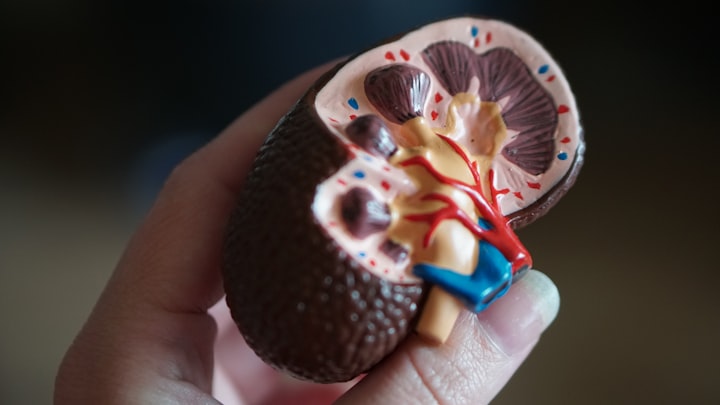What You Need to Know to Get Rid of Kidney Stones with the Proper Diet
A very common disease

In India, the prevalence of kidney stone disease is high, with a population-wide urinary stone risk estimated to be 12%.
Nephrolithiasis, also known as urolithiasis, is the development of kidney or urinary calculi. The abdomen and flanks are incredibly painful as a result of this illness. In wealthy countries, around 10-12 pr percent of the population is plagued by kidney stones. Significant dietary modifications over the past few years have shortened detection age while increasing the severity of kidney stone disease (KDS). 6% of men are twice as likely to get kidney stones as women. Additionally, it has been noted that the initial stone-related incident usually occurs between the ages of 20 and 40. In the course of five years, kidney stones can recur in about half of patients. The importance of keeping in mind that this can be prevented by adhering to adequate diet cannot be overstated as we observe National Nutrition Week today.
IN INDIA, KIDNEY STONES ARE ABUNDANT
Among India, KSD is common and has a 12% longevity in a populace that is generally thought to be predisposed to urinary stones. Out of this 12%, renal impairment has a major impact on 50% of the population, frequently leading to kidney loss. It is important to eat a healthy nutrient diet because the kidneys are essential life-sustaining organs that conduct numerous tasks to keep the blood cleansed and continuously manage the body's electrolytes and water level. The goal of nutritional therapy of kidney stones is to prevent the growth of current stones and the formation of new stones. While medication is frequently used to cure kidney stones, dietary adjustments might lessen the severity of the consequences.
KIDNEY STONES CAN BE RELEASED BY NUTRITION.
The following list of nutrient-dense foods can help dissolve kidney stones:
Drink a lot of fluids.
Kidney stones can be very unpleasant to bypass. The most important thing kidney stone sufferers can do to dissolve their current stones and prevent new ones from forming is to drink plenty of fluids. Individuals who generated 2 to 2.5 liters of urine per day were 50% less likely to develop kidney stones than those who generated less, according to a 2015 National Kidney Foundation meta-analysis. Water is more efficient than other fluids, and it takes almost 2 liters of water per day to improve kidney function. Untreated water does not profit from nutrients, but it does convey essential nutrients all over the body. Additional fluids that are advantageous include:
• Due to their abundance in citrate and magnesium, fresh tomato, orange, and pomegranate juices have been shown to be useful in avoiding the formation of stones.
• Lime juice can raise urine citrate levels and probably lower kidney stone risk.
• Apple Cider Vinegar contains citric acid, which helps dissolve kidney stones by alkalizing the blood and urine and facilitating the easier removal of toxins from the kidney.
• Watermelon juice is diuretic and high in potassium salts, which help in the regulation of urine acidity and the removal of small stones and crystals.
Boost your consumption of foods high in calcium.
Because dietary calcium binds oxalate in the intestines, the kidneys absorb less of it, and the concentration of oxalate in urine is reduced. Beans, lentils, seeds, yogurt, and soy products are all fantastic sources of calcium-rich diet. For instance, eating kidney beans instead of meat or other high-cholesterol protein sources has a good effect on one's health. Kidney beans have a kidney-like structure, and the Vitamin B they contain helps to wash away kidney stones. Additionally, an excellent dose of fiber and minerals that improve urinary tract health are found in kidney beans.
Select whole-grain foods and veggies high in magnesium.
Green vegetables are extremely nutritious, and many of them are rich in magnesium, which improves kidney function and aids in the dissolution of stones. Magnesium-rich plants include kale, spinach, collard greens, turnip greens, and mustard greens. People who ingest more magnesium have a lower risk of getting kidney stones because it lowers the absorption of the mineral oxalate. By lowering calcium and oxalate absorption, a high-fiber diet and choosing whole-grain meals can further reduce the likelihood of kidney stones enlarging.
TAKEAWAY
Keeping a diet rich in nutrients is good for kidney health, but quitting some behaviors is even more crucial. Remember the following advice:
• Try to shed weight if you are fat or overweight.
• Avoid foods high in purines.
• Cut back on the salt and sugar in your meals and beverages.
• Consume alcohol in moderation.
• Limit your intake of vitamin C pills.
(This article is authored by Mr.Archit Garg, Co-Founder, Glamyo Health)
About the Creator
Mashal Haroon
At 17 years old, I found a way of digging into my soul and drawing my demons in the most beautiful way possible. Poems became my escape and enlightening others of the same treasure, became my goal.






Comments
There are no comments for this story
Be the first to respond and start the conversation.